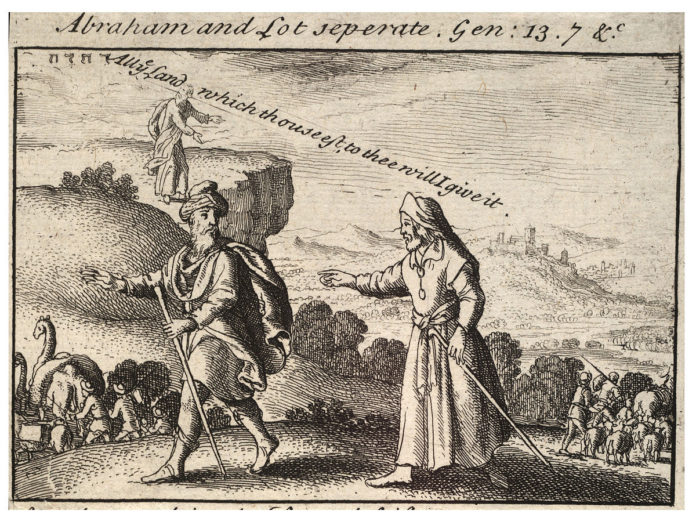Before Lot and Avraham parted ways the two were very close. They shared resources and traveled together, from Charan to Canaan, down to Egypt and once again back to Canaan. One would presume that despite their many differences, Avraham was able to make a favorable impression upon his nephew.
Bear in mind, this is a man who, along with his wife, single-handedly inspired a generation. It is safe to assume that Lot as well was affected positively by the long-lasting relationship he shared with Avraham. And though he elected to live in Sodom for the financial gain, it becomes clear that middat ha’chessed, the attribute of loving kindness, was part of his persona.
Consider the manner in which he welcomes his visitors. The Rabbis teach us1 that a proclamation was made in Sodom:
“Anyone who provides bread for the poor and destitute shall be burnt by fire.”
Sodom had not just exhibited cruelty as an unfortunate reality or trend; it was rather the product of a systematic, calculated and legal construct.
Lot, on the other hand, appears to be defying the culture – he is warm and benevolent to strangers2, greeting his guests, bowing to the ground before them, feeding them and providing a place to rest, and water to wash their feet. We should point out that every measure taken by Lot is identical to the conduct of Avraham as he greets his guests at the start of our parsha.
It appears as though the attribute of loving-kindness, the trait for which Avraham was renowned, had made a lasting impression upon Lot, informing him even in the absence of his mentor.
Rashi even adds that this episode occurred around Pesach time and hence he was baking matzot.
Whether or not we take this literally, the image of Lot preparing the unleavened bread only adds to portrait of a man who does not allow the ethos of his culture to affect his behavior. After all, here he was in the middle of the worst neighborhood in the history of mankind and his kids are calling out the Ma Nishtana!
But the Ramban notes that it is not entirely true about Lot, and that he was indeed affected by his environment. For let us recall what happens a moment later when his neighbors attempt the unthinkable with his guests3:
“And they called out to Lot and they said – where are the men who approached you at night? Take them out so that we may know them”
And what is Lot’s response? How does our master of hachnasat orchim (welcoming of guests) conduct himself?
“And Lot went out unto them to the door, shutting the door behind him. And he said: ‘I pray you, my brethren, do not act in such a wicked manner.”
To continue to build off of imagery established above; imagine that Lot is in the middle of his seder, he comes to the door to greet Elijah the Prophet and instead discovers a maddening crowd with pitchforks and shotguns in hands!
Lot’s bravery and rebuke of the Sodomites is noteworthy. Who among us would have the courage to stand up to such a menacing threat to protect a stranger?
But this is where things turn. For Lot doesn’t stop there, and instead, he presents the angry masses with a most unsavory alternative:
“Behold now, I have two daughters … let me, I pray you, bring them out to you, and do with them as you please.”
To say the least, Lot is not on the shortlist for the father-of-the-year award.
The Ramban picks up on this contradictory behavior, Lot who on the one hand was so gracious with his guests shielding them from the worst sort of people, willingly offers up his own daughters to the very same thugs!
“The normal way in the world is that a man would be willing to sacrifice himself on behalf of his daughters and wife, but Lot sacrificed his own daughters!”
How does this happen? How did Lot, who set out to be so altruistic and hospitable, commit a shameful act such as giving his daughters up to the men of Sodom?
The explanation is a simple but profound one – it is impossible to live a life of selflessness and kind-heartedness in a culture of cruelty. One cannot maintain their warmth in a community in which everyone is cold.
Lot wanted to live the life that his uncle had lived in Canaan, but felt it was possible to do so while living elsewhere. He wished to bring the “Abrahamic ideal” into Sodom. That ideal, however, is a pipe dream and a fantasy. If the zeitgeist of one’s time is callousness and indifference then even the finest families will be sullied and degraded through association. One might have the purest of intentions, but eventually, the corruption will seep into your own home, it is unavoidable!
If your friends and colleagues all cheat on their taxes, you will be impacted in some way. Perhaps you will be tempted to cut corners, to round off certain numbers, and maybe you won’t but at the very least exposure to corruption desensitizes the best of us.
The verse reminds us of the penetrating reach of Sodom’s influence when we are informed that the crowd of rioters outside of the door contained children as well as fully-grown adults5. One shudders to consider the image young children beating at the door, swarming around the home, making depraved and immodest demands! How does it happen? The answer is that the environmental influences can create a tectonic shift in the hearts and minds of the pure and innocent. It is well known that the Germans took the indoctrination of small children to a new level, filling innocent hearts with hate and malice.
And so, despite Lot’s upbringing and tutelage under the wing of Avraham, he succumbs to the values and standards of his new home. The only recourse for Lot and his family is to be extricated at once. Which is the very reason that when Avraham made his initial appeal6 on behalf of Sodom, he gives up midstream. He began by petitioning for their survival, insinuating that if there were fifty righteous individuals that they would be worthy of redemption. After learning from God that there weren’t fifty, he worked his way down by tens, first to forty, then thirty, and all the way down to ten:
אוּלַ֛י יִמָּצְא֥וּן שָׁ֖ם עֲשָׂרָ֑ה
Perchance, there will be ten righteous among them?
It’s incredible! Avraham does not want to take no for an answer! But then he suddenly stops arguing at ten. Why does Avraham stop? Did his courage fail him? Was Avraham afraid of hearing “no” yet again? Didn’t he care about the nine righteous inhabitants who may have dwelled in the city?
Rabbi Ovadiah Sforno argues that Avraham asks for the city to be spared if there is a given number of tzaddikim present, but it wasn’t an appeal on behalf of the righteous. For certainly every righteous person deserves to be saved. Rather, it was a plea with a different goal in mind – the hope that the evildoers will repent. And in order for a community of sinners to do teshuva, it is contingent on having some righteous who can inspire that sort of change. That being said, fewer than a quorum of ten tzaddikim, would not have been sufficient to change a culture and to influence others. It’s not to suggest that the individuals weren’t worthy, but if you don’t have a nucleus with a strong moral constitution, then everyone will be corrupted in the end.
What happens to Lot is that even while he tries to preserve the values of chesed – he is overwhelmed by his environment, and מדת סדום conquers all, to such an extent that he is willing to give up his own daughters!
One or two heroes cannot carry a community – they can’t keep a minyan together, they can’t represent everyone at the shiurim, they cannot do it, and what’s even more devastating is that in a culture in which no one shows up, eventually the individuals who do care enough will have no choice but to become corrupted themselves, or will need to be extricated.
If we find that the best members of our community leave or slide over to more “dedicated” communities, we have to ask ourselves why.
The best of us make aliya (not only is it a mitzvah but its invariably a better Jewish lifestyle). The best of us move to communities saturated with Torah life. The slide to the right is not just about religious validation – it stems from a growing sense that our own communities cannot sustain the growth which is wanted.
Nonetheless, we mustn’t use this as an excuse to throw up our arms and abandon ship. For the onus weighs just as heavily upon the growth-oriented individuals. Rabbi Samson Raphael Hirsch sees the request of “בתוך העיר” as a reproach of sorts. “Perhaps there are ten righteous members in the city”. What is instructive here is that the tzaddik has an obligation to be part of the city, not aloof and not an elitist. Rather, they must see themselves as a critical cast member in the spiritual advancement of the entire community. The type of tzaddikim Avraham was hoping to see, the sort of tzaddikim for whom Sodom might have been saved were those who help enhance their community, who inspire their neighbors, who challenge their friends to be better people. He concludes with a damning comment of rebuke for anyone who hopes to live out their life in righteous seclusion and make no attempt to improve the fate of others:
“אם כך הוא עושה, בעצם התנהגותו זו כבר הוציא את עצמו מכלל הצדיקים“
“If so, he is no tzaddik at all, for through his elitist conduct, he has already excluded himself from the lot of the righteous”
Rav Hirsch informs us that without the notion of, בתוך העיר , “being part of the city” ingrained in your service of the Almighty, all of the mitzvot in the world are of little help. After all, we must remind ourselves that during the period of the destruction of Jerusalem there were many tzaddikim who lacked in their sense of community:
Many righteous individuals lived during the period of destruction, who observed the entirety of our Torah, from aleph to taf, but failed to be a “part of the city”, satisfied with their own actions, while helping no one else take corrective action.
May we build a Jewish community which is not only worthy of preservation but one which enhances the lives of its inhabitants; and at the same time, one whose inhabitants see this ideal as its Divinely inspired mandate.







